Resume
Academic Advisor Cover Letter Examples

May 29, 2025
|
12 min read
Master the art of crafting a stellar academic advisor cover letter and ensure you don't get "course-corrected" out of the job. Learn essential tips to highlight your advisory skills and make a lasting impression.
4.70 Average rating
Rated by 348 people
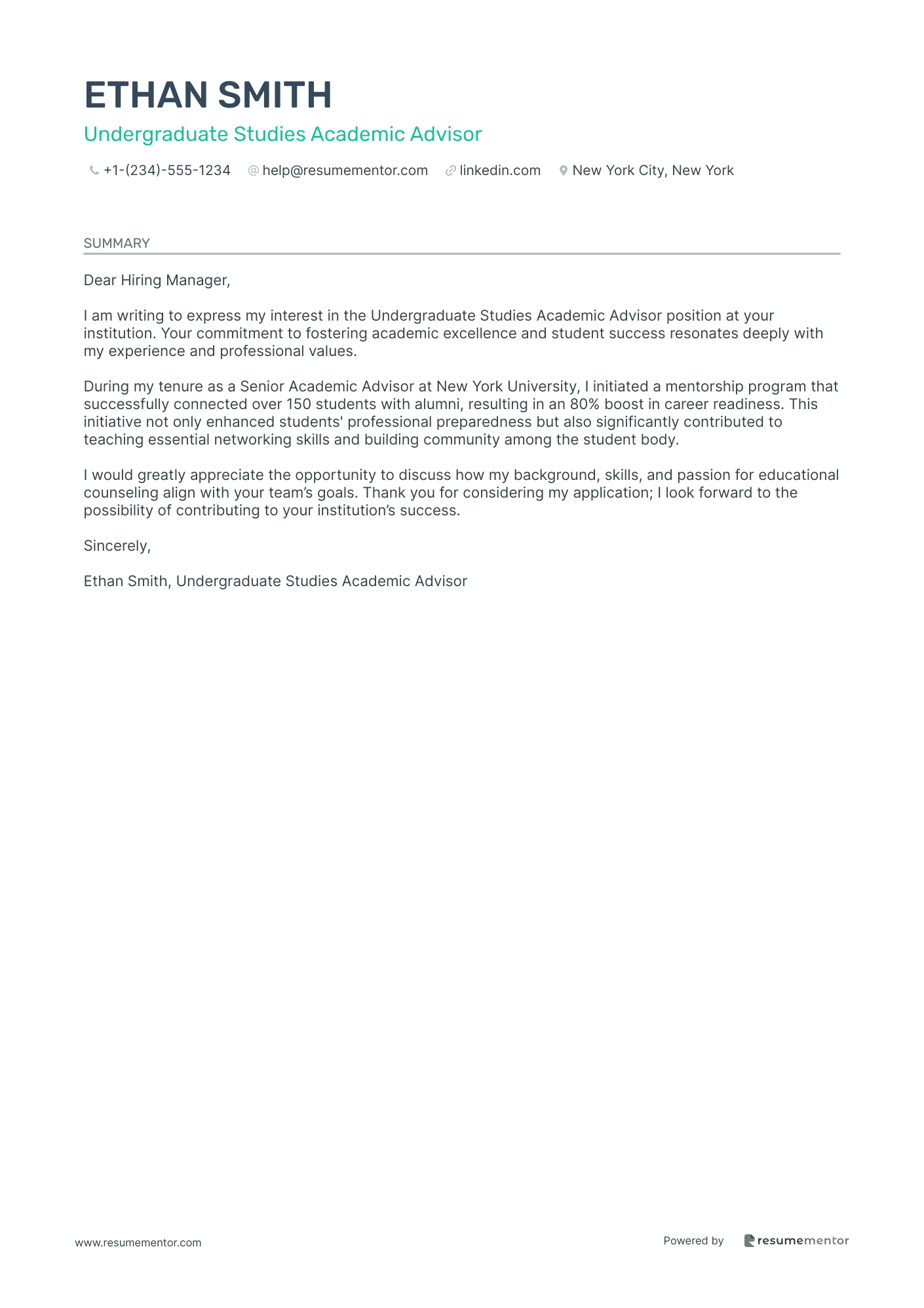
Undergraduate Studies Academic Advisor
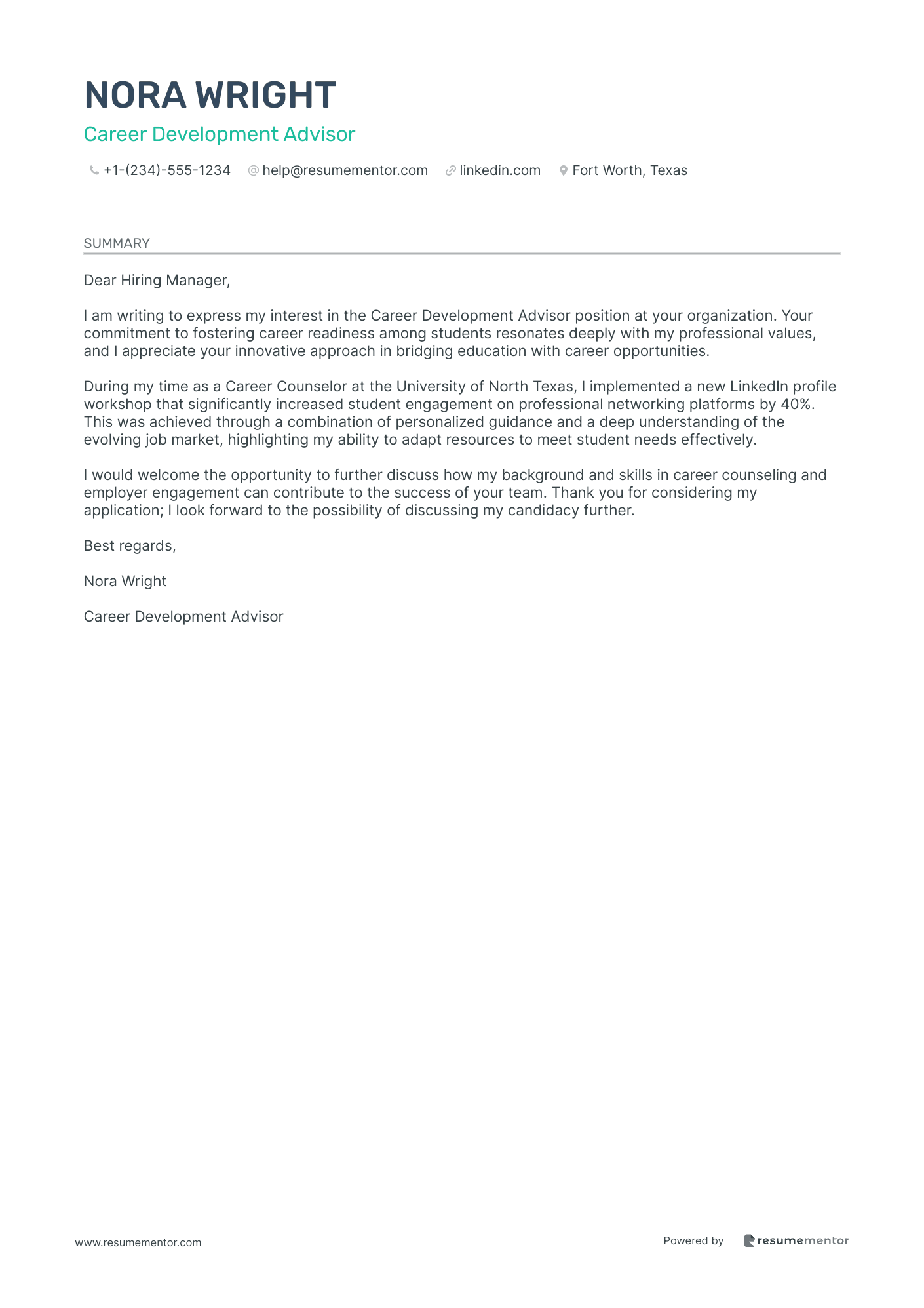
Career Development Advisor
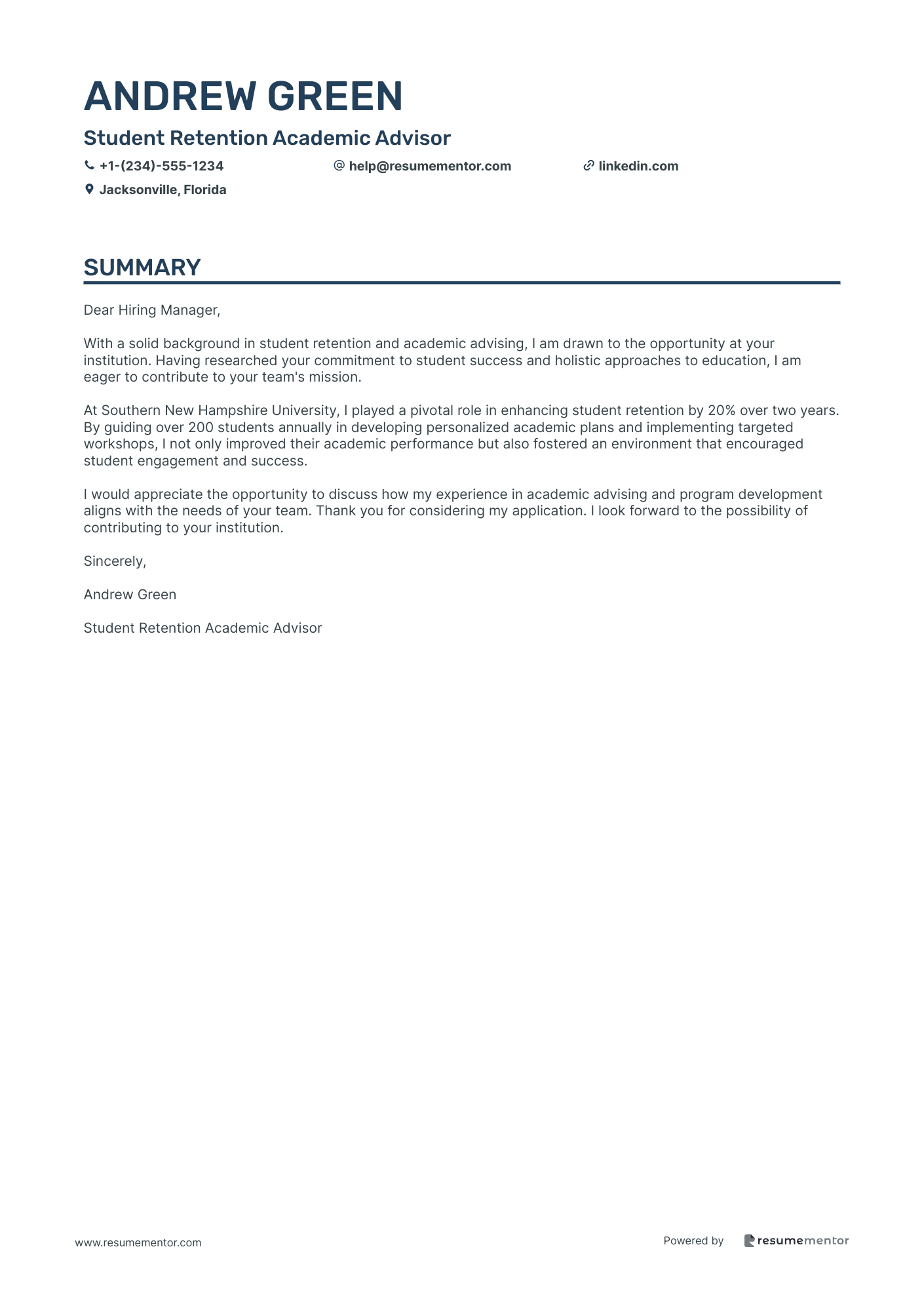
Student Retention Academic Advisor
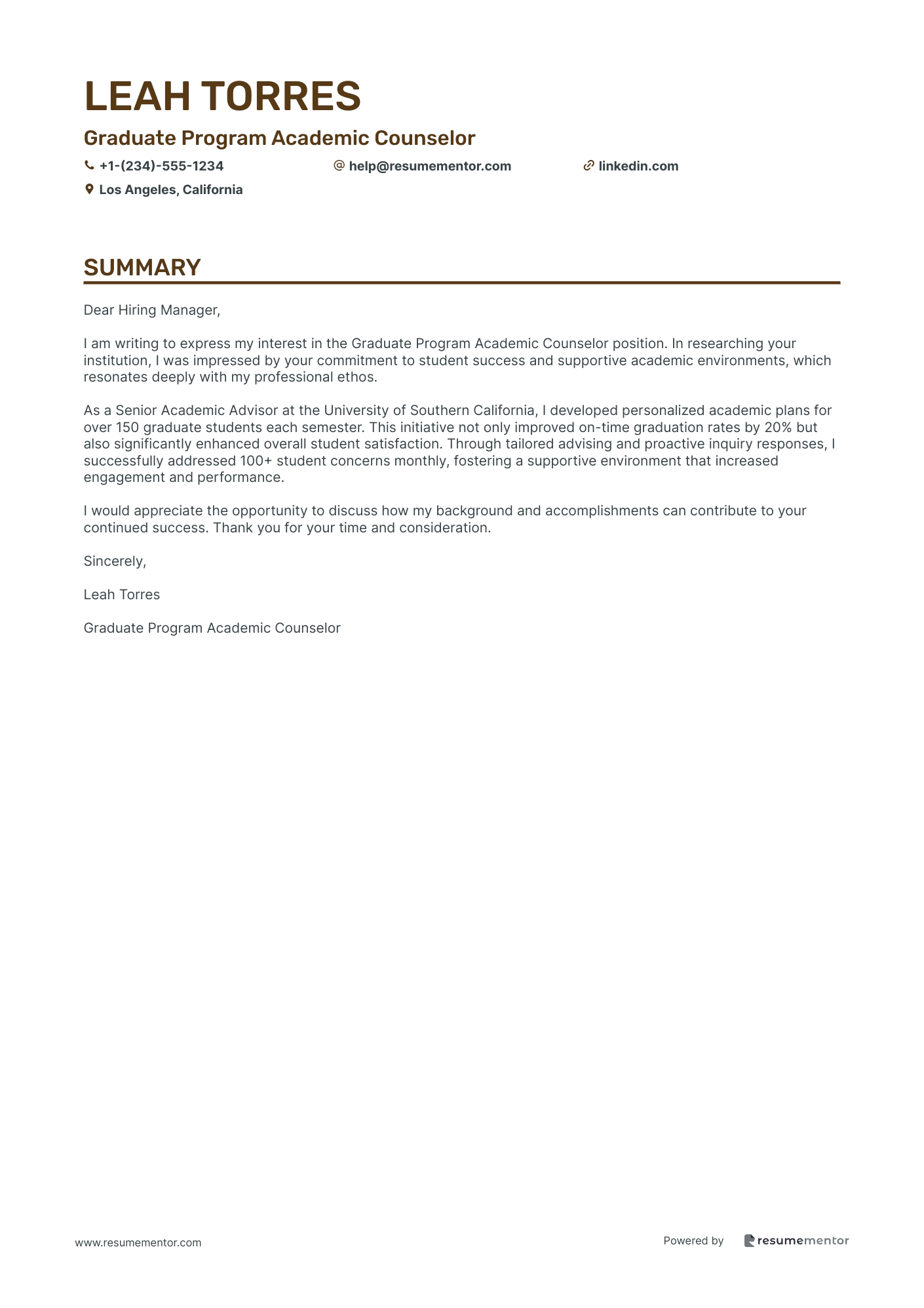
Graduate Program Academic Counselor
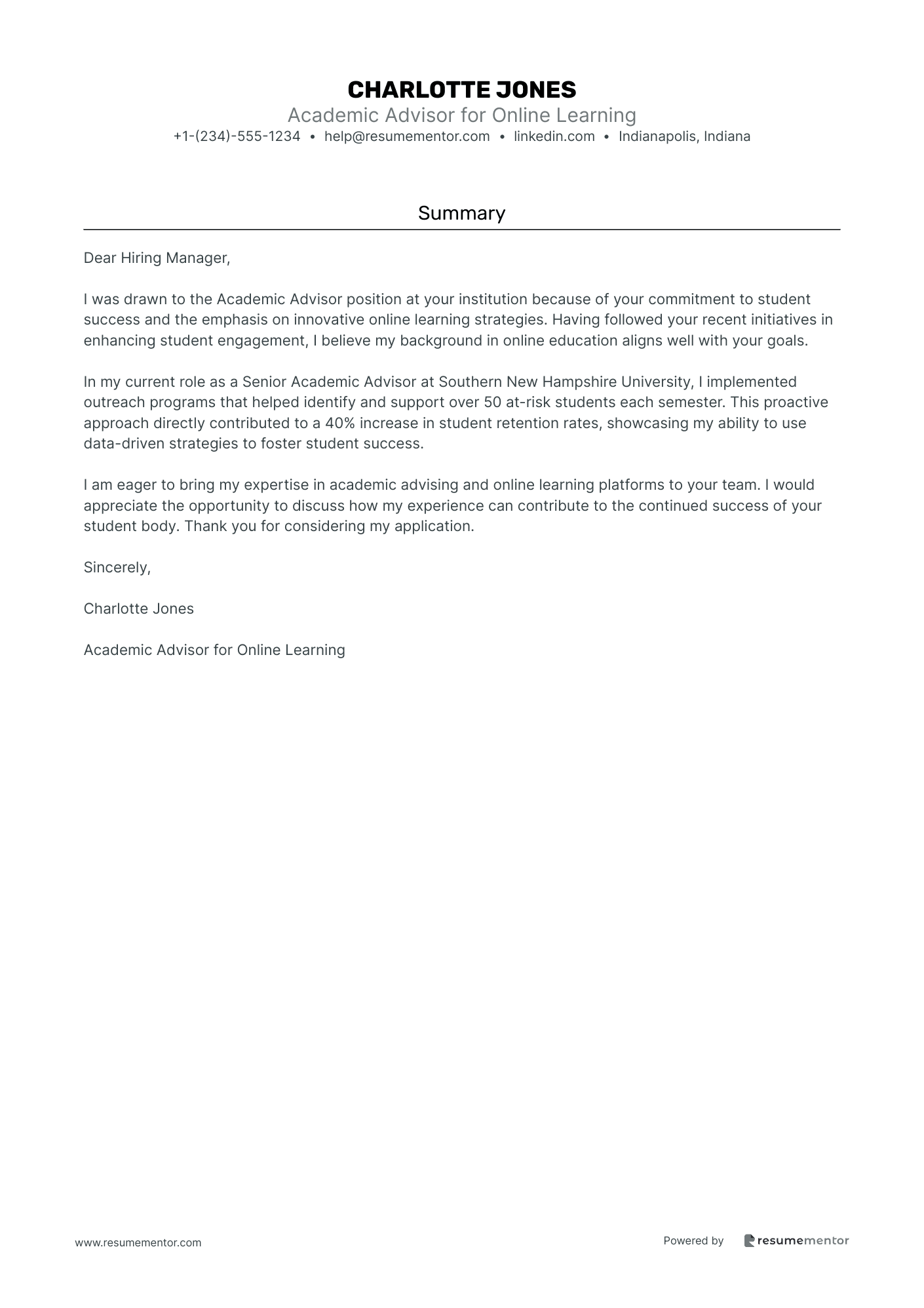
Academic Advisor for Online Learning
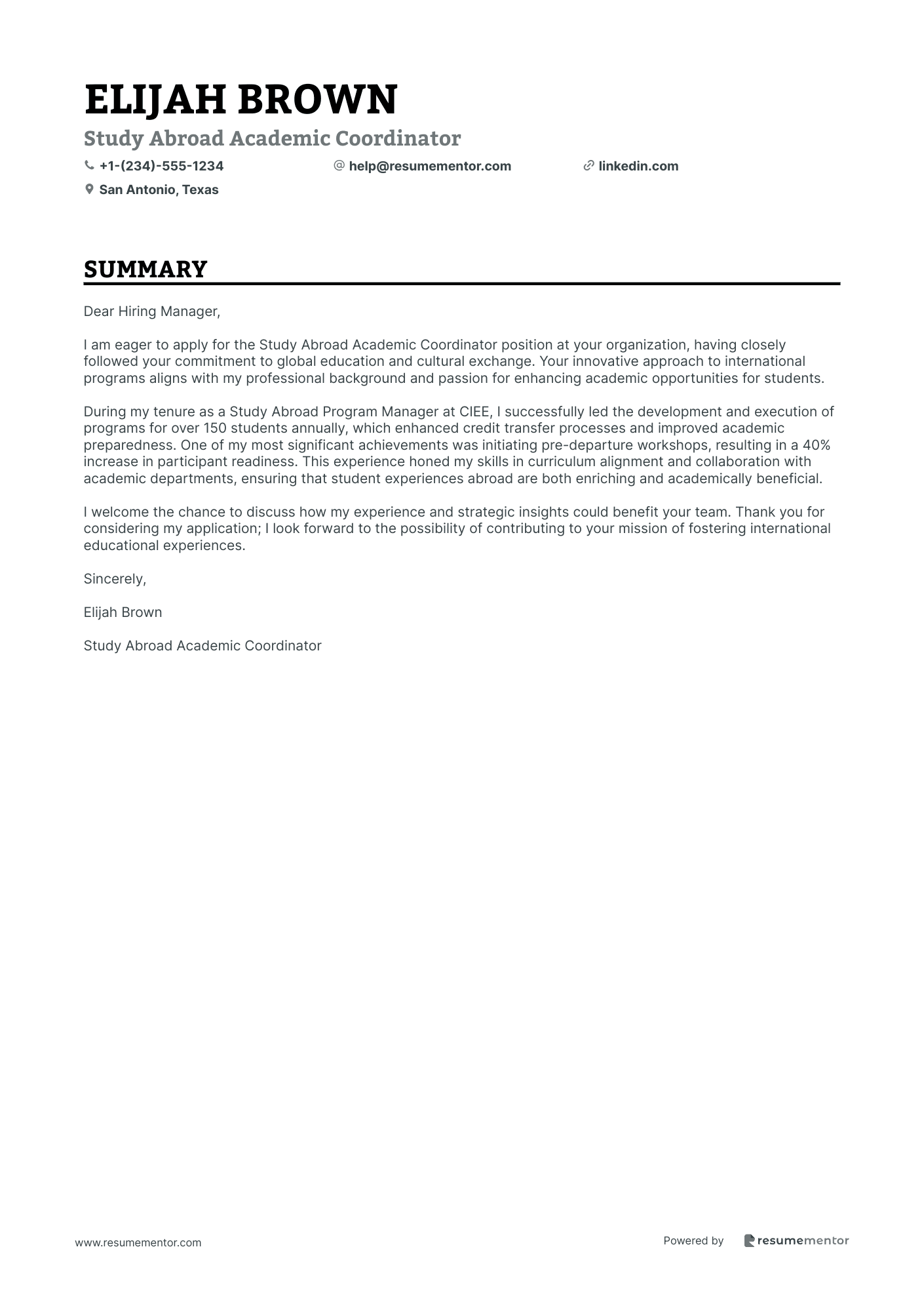
Study Abroad Academic Coordinator
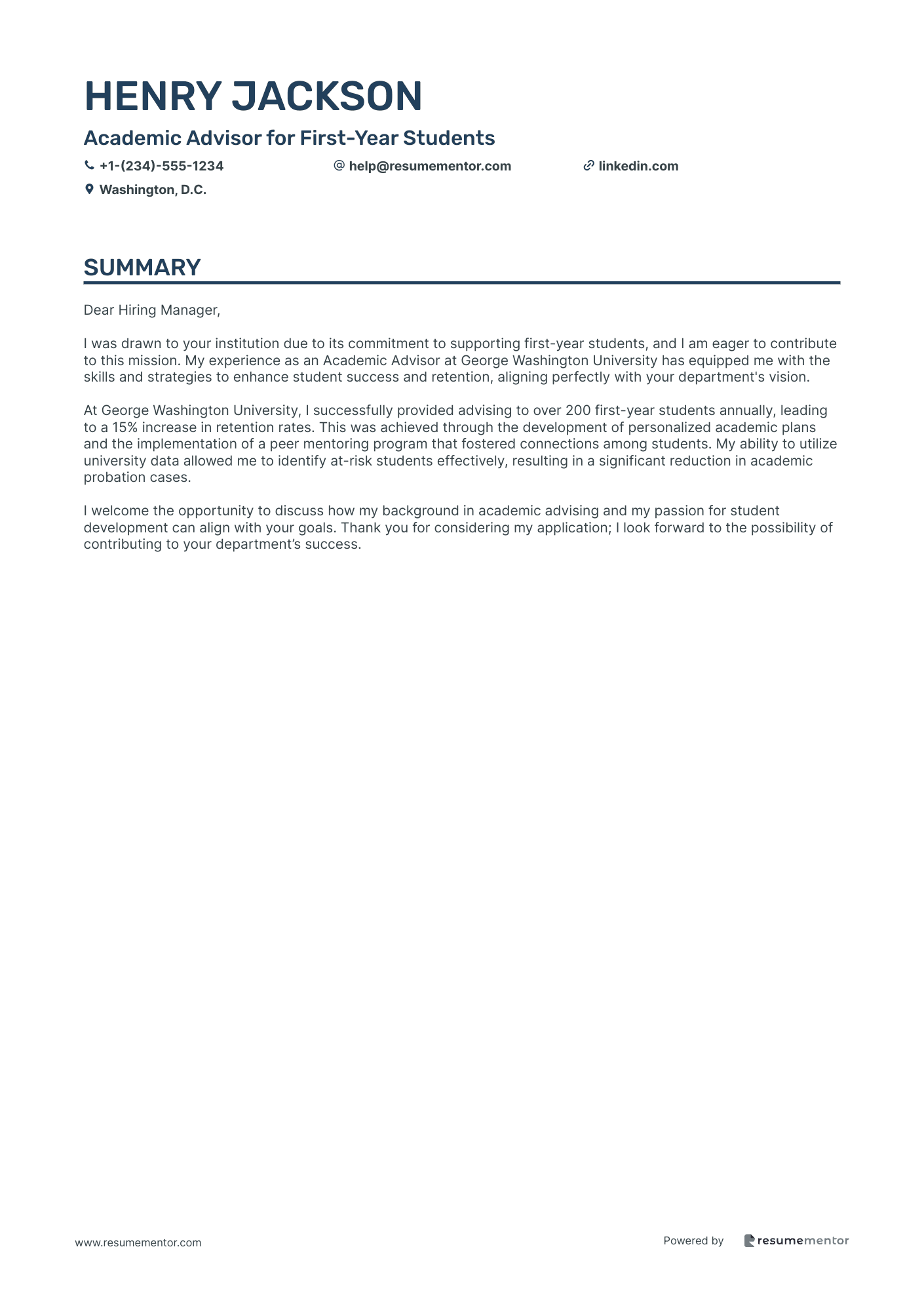
Academic Advisor for First-Year Students
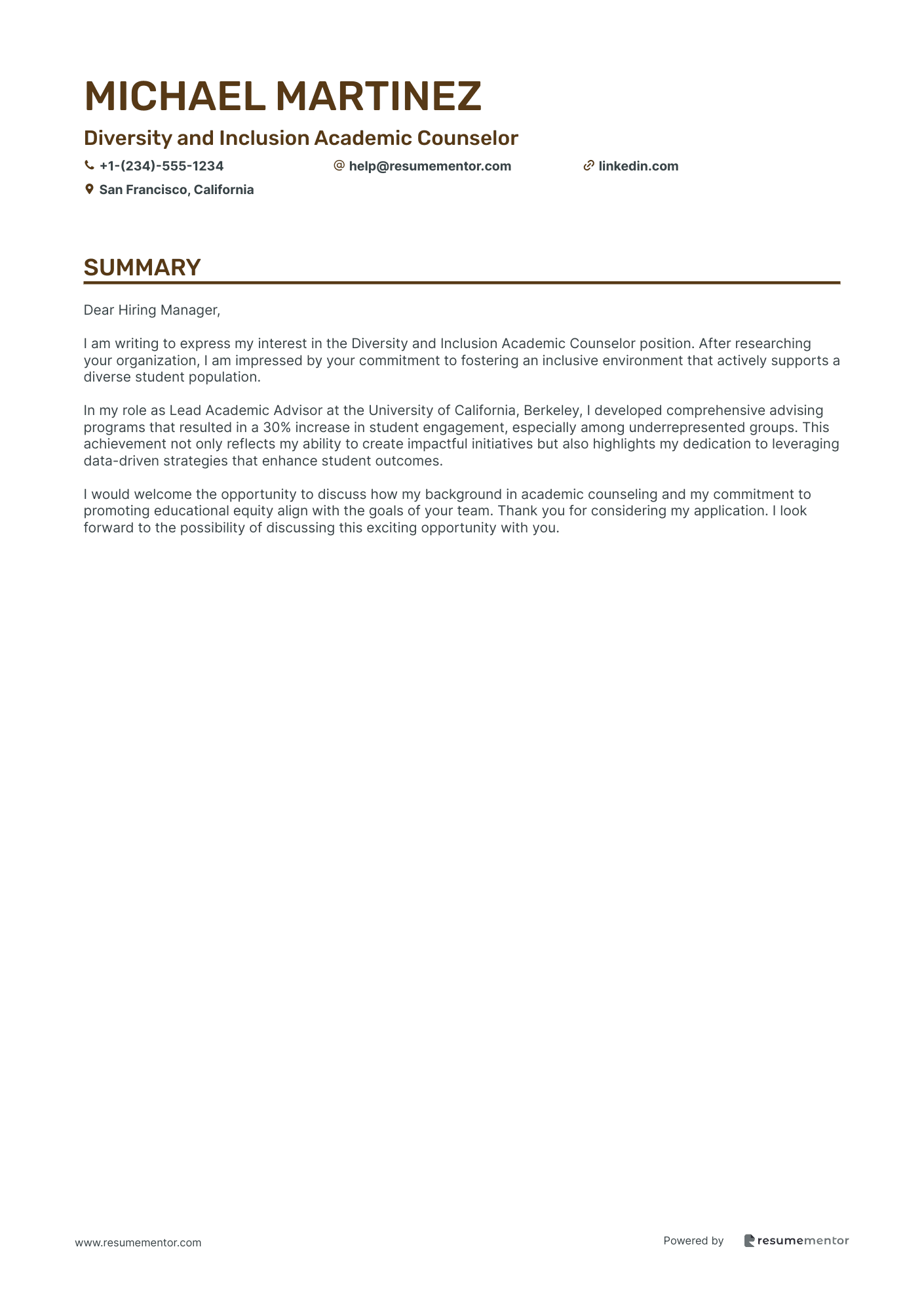
Diversity and Inclusion Academic Counselor
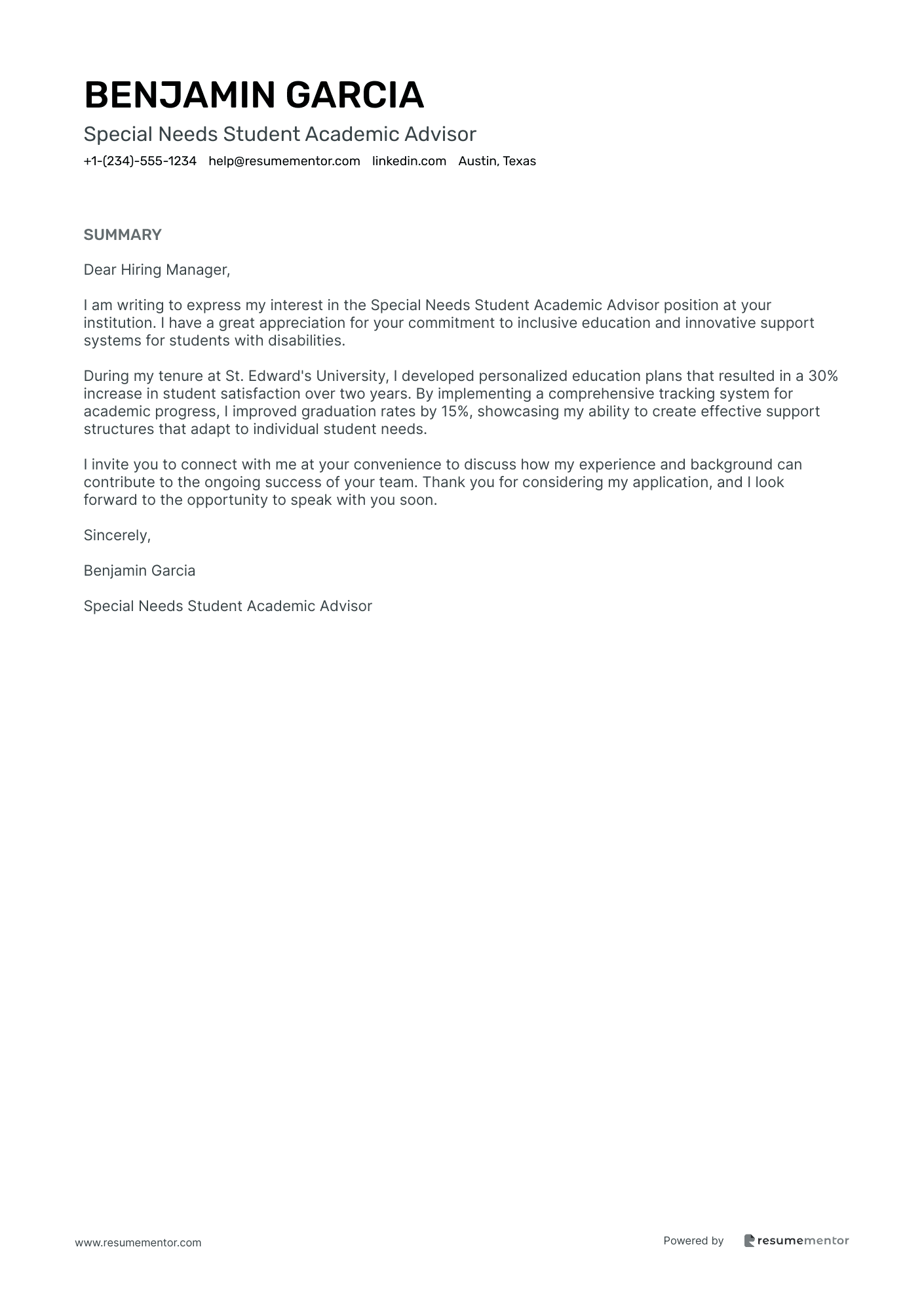
Special Needs Student Academic Advisor
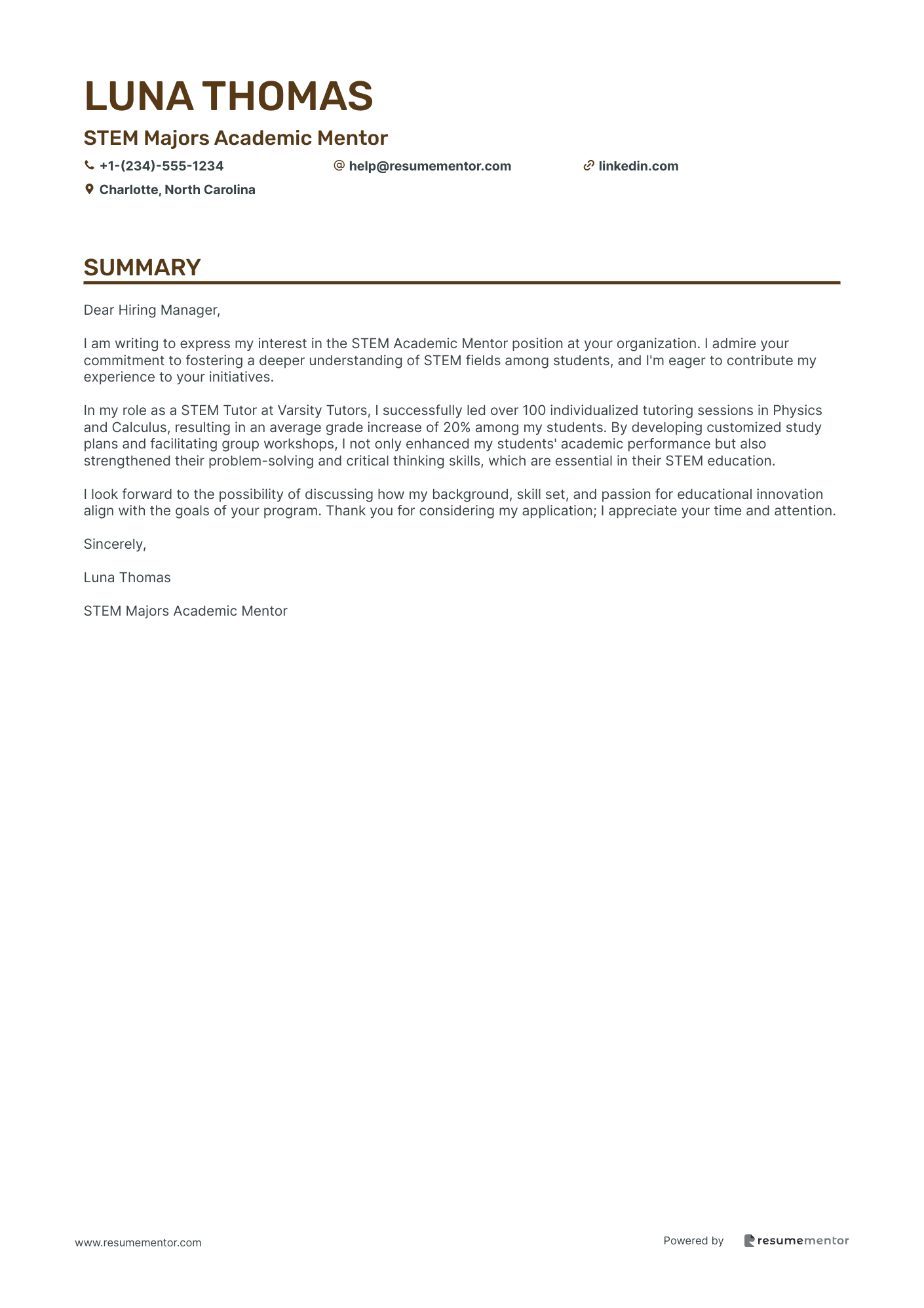
STEM Majors Academic Mentor

Undergraduate Studies Academic Advisor cover letter sample
When crafting your cover letter, emphasize any experience in academic advising or student support roles. Highlight your ability to communicate effectively and build rapport with students. If you've participated in workshops or earned certifications in academic counseling or higher education administration, mention these. Showcase examples of how your guidance has positively impacted student retention or success rates, using a 'skill-action-result' format. Illustrating your problem-solving capabilities and understanding of academic policies will further strengthen your application. Remember to convey your passion for helping students achieve their educational goals.
Ethan Smith
Undergraduate Studies Academic Advisor
Summary
Dear Hiring Manager,
I am writing to express my interest in the Undergraduate Studies Academic Advisor position at your institution. Your commitment to fostering academic excellence and student success resonates deeply with my experience and professional values.
During my tenure as a Senior Academic Advisor at New York University, I initiated a mentorship program that successfully connected over 150 students with alumni, resulting in an 80% boost in career readiness. This initiative not only enhanced students' professional preparedness but also significantly contributed to teaching essential networking skills and building community among the student body.
I would greatly appreciate the opportunity to discuss how my background, skills, and passion for educational counseling align with your team’s goals. Thank you for considering my application; I look forward to the possibility of contributing to your institution’s success.
Sincerely,
Ethan Smith, Undergraduate Studies Academic Advisor
Career Development Advisor cover letter sample
Focus on your experience in guiding individuals through career changes. Highlight your ability to assess clients’ strengths and interests, offering personalized advice. Mention any relevant degrees or certifications in counseling or coaching, and include specific workshops you've conducted. Use metrics to quantify your impact, such as the number of clients successfully placed in jobs or improved satisfaction ratings. Share examples of how your strategies helped clients achieve their goals, following a 'situation-action-result' format to clearly demonstrate your effectiveness in facilitating career growth.
Nora Wright
Career Development Advisor
Summary
Dear Hiring Manager,
I am writing to express my interest in the Career Development Advisor position at your organization. Your commitment to fostering career readiness among students resonates deeply with my professional values, and I appreciate your innovative approach in bridging education with career opportunities.
During my time as a Career Counselor at the University of North Texas, I implemented a new LinkedIn profile workshop that significantly increased student engagement on professional networking platforms by 40%. This was achieved through a combination of personalized guidance and a deep understanding of the evolving job market, highlighting my ability to adapt resources to meet student needs effectively.
I would welcome the opportunity to further discuss how my background and skills in career counseling and employer engagement can contribute to the success of your team. Thank you for considering my application; I look forward to the possibility of discussing my candidacy further.
Best regards,
Nora Wright
Career Development Advisor
Student Retention Academic Advisor cover letter sample
When applying for this role, highlight any previous experience in advising or counseling students. Demonstrating empathy and strong interpersonal skills is essential. If you have completed workshops or training in student development theories, mention those and outline their relevance. Incorporate specific examples of how you've successfully improved student engagement or retention rates. Use the 'skill-action-result' format to illustrate how your strategies led to positive outcomes for students and the institution, making your application stand out with tangible achievements.
Andrew Green
Student Retention Academic Advisor
Summary
Dear Hiring Manager,
With a solid background in student retention and academic advising, I am drawn to the opportunity at your institution. Having researched your commitment to student success and holistic approaches to education, I am eager to contribute to your team's mission.
At Southern New Hampshire University, I played a pivotal role in enhancing student retention by 20% over two years. By guiding over 200 students annually in developing personalized academic plans and implementing targeted workshops, I not only improved their academic performance but also fostered an environment that encouraged student engagement and success.
I would appreciate the opportunity to discuss how my experience in academic advising and program development aligns with the needs of your team. Thank you for considering my application. I look forward to the possibility of contributing to your institution.
Sincerely,
Andrew Green
Student Retention Academic Advisor
Graduate Program Academic Counselor cover letter sample
When crafting your cover letter, focus on your experience in academic advising or related roles. Highlight your ability to build rapport with students and guide them in their educational journeys. Emphasize any knowledge of academic policies or programs that showcase your expertise. Include specific instances where your advice led to improved student outcomes or retention rates. Using data or metrics will strengthen your case. Additionally, mention any training or workshops you've completed that relate to counseling practices, showcasing your commitment to student success.
Leah Torres
Graduate Program Academic Counselor
Summary
Dear Hiring Manager,
I am writing to express my interest in the Graduate Program Academic Counselor position. In researching your institution, I was impressed by your commitment to student success and supportive academic environments, which resonates deeply with my professional ethos.
As a Senior Academic Advisor at the University of Southern California, I developed personalized academic plans for over 150 graduate students each semester. This initiative not only improved on-time graduation rates by 20% but also significantly enhanced overall student satisfaction. Through tailored advising and proactive inquiry responses, I successfully addressed 100+ student concerns monthly, fostering a supportive environment that increased engagement and performance.
I would appreciate the opportunity to discuss how my background and accomplishments can contribute to your continued success. Thank you for your time and consideration.
Sincerely,
Leah Torres
Graduate Program Academic Counselor
Academic Advisor for Online Learning cover letter sample
In your cover letter, emphasize your experience with online education platforms and student support services. Highlight any training you've received in academic advising or counseling. Be sure to mention your ability to guide students in course selection, time management, and goal setting. Use specific examples to show how your advice has led to student success rates or improved retention in previous roles. Show your commitment to fostering a positive and inclusive learning environment, as this will resonate with hiring managers focused on student outcomes.
Charlotte Jones
Academic Advisor for Online Learning
Summary
Dear Hiring Manager,
I was drawn to the Academic Advisor position at your institution because of your commitment to student success and the emphasis on innovative online learning strategies. Having followed your recent initiatives in enhancing student engagement, I believe my background in online education aligns well with your goals.
In my current role as a Senior Academic Advisor at Southern New Hampshire University, I implemented outreach programs that helped identify and support over 50 at-risk students each semester. This proactive approach directly contributed to a 40% increase in student retention rates, showcasing my ability to use data-driven strategies to foster student success.
I am eager to bring my expertise in academic advising and online learning platforms to your team. I would appreciate the opportunity to discuss how my experience can contribute to the continued success of your student body. Thank you for considering my application.
Sincerely,
Charlotte Jones
Academic Advisor for Online Learning
Study Abroad Academic Coordinator cover letter sample
In your cover letter, emphasize any experience you have working with international students or in multicultural environments. Highlight your organizational skills, especially in managing program logistics, advising students, or arranging travel and accommodations. Mention any relevant degrees or certifications in education or international studies. Provide concrete examples of how you have successfully improved student engagement or program outcomes. Use metrics when possible, like increased participation rates or student satisfaction scores, to demonstrate the impact of your work on previous institutions.
Elijah Brown
Study Abroad Academic Coordinator
Summary
Dear Hiring Manager,
I am eager to apply for the Study Abroad Academic Coordinator position at your organization, having closely followed your commitment to global education and cultural exchange. Your innovative approach to international programs aligns with my professional background and passion for enhancing academic opportunities for students.
During my tenure as a Study Abroad Program Manager at CIEE, I successfully led the development and execution of programs for over 150 students annually, which enhanced credit transfer processes and improved academic preparedness. One of my most significant achievements was initiating pre-departure workshops, resulting in a 40% increase in participant readiness. This experience honed my skills in curriculum alignment and collaboration with academic departments, ensuring that student experiences abroad are both enriching and academically beneficial.
I welcome the chance to discuss how my experience and strategic insights could benefit your team. Thank you for considering my application; I look forward to the possibility of contributing to your mission of fostering international educational experiences.
Sincerely,
Elijah Brown
Study Abroad Academic Coordinator
Academic Advisor for First-Year Students cover letter sample
When applying for this position, it’s important to highlight any experience you have in academic counseling or education. Show your understanding of first-year student challenges, such as transition issues and course selection. Include any relevant training, workshops, or certifications, like 'Advising Strategies' or 'Student Development'. Use specific examples to illustrate how you've supported students in achieving academic success, demonstrating engagement or retention improvements. Focus on your ability to build relationships and your strong organizational skills, which can lead to more effective advising experiences.
Henry Jackson
Academic Advisor for First-Year Students
Summary
Dear Hiring Manager,
I was drawn to your institution due to its commitment to supporting first-year students, and I am eager to contribute to this mission. My experience as an Academic Advisor at George Washington University has equipped me with the skills and strategies to enhance student success and retention, aligning perfectly with your department's vision.
At George Washington University, I successfully provided advising to over 200 first-year students annually, leading to a 15% increase in retention rates. This was achieved through the development of personalized academic plans and the implementation of a peer mentoring program that fostered connections among students. My ability to utilize university data allowed me to identify at-risk students effectively, resulting in a significant reduction in academic probation cases.
I welcome the opportunity to discuss how my background in academic advising and my passion for student development can align with your goals. Thank you for considering my application; I look forward to the possibility of contributing to your department’s success.
Diversity and Inclusion Academic Counselor cover letter sample
In your cover letter, showcase any prior experience working with diverse populations or in multicultural environments. Highlight your understanding of equity and social justice principles. If you've completed training or workshops on diversity initiatives, include them to demonstrate your commitment and knowledge in this area. Use specific examples to illustrate how you have supported underrepresented students, focusing on outcomes and improvements. Employ a 'situation-action-result' framework to show how your efforts have led to positive changes in student engagement or retention rates.
Michael Martinez
Diversity and Inclusion Academic Counselor
Summary
Dear Hiring Manager,
I am writing to express my interest in the Diversity and Inclusion Academic Counselor position. After researching your organization, I am impressed by your commitment to fostering an inclusive environment that actively supports a diverse student population.
In my role as Lead Academic Advisor at the University of California, Berkeley, I developed comprehensive advising programs that resulted in a 30% increase in student engagement, especially among underrepresented groups. This achievement not only reflects my ability to create impactful initiatives but also highlights my dedication to leveraging data-driven strategies that enhance student outcomes.
I would welcome the opportunity to discuss how my background in academic counseling and my commitment to promoting educational equity align with the goals of your team. Thank you for considering my application. I look forward to the possibility of discussing this exciting opportunity with you.
Special Needs Student Academic Advisor cover letter sample
When applying for this position, it's important to showcase any experience working directly with special needs students. Highlight your knowledge of individual education plans (IEPs) and any training related to behavior management or adaptive learning strategies. Mention your empathy and patience, as these traits are essential in this role. Provide examples of how you have supported students in achieving their academic goals. Use specific metrics or success stories to demonstrate your impact, following a 'skill-action-result' format to make your application more compelling.
Benjamin Garcia
Special Needs Student Academic Advisor
Summary
Dear Hiring Manager,
I am writing to express my interest in the Special Needs Student Academic Advisor position at your institution. I have a great appreciation for your commitment to inclusive education and innovative support systems for students with disabilities.
During my tenure at St. Edward's University, I developed personalized education plans that resulted in a 30% increase in student satisfaction over two years. By implementing a comprehensive tracking system for academic progress, I improved graduation rates by 15%, showcasing my ability to create effective support structures that adapt to individual student needs.
I invite you to connect with me at your convenience to discuss how my experience and background can contribute to the ongoing success of your team. Thank you for considering my application, and I look forward to the opportunity to speak with you soon.
Sincerely,
Benjamin Garcia
Special Needs Student Academic Advisor
STEM Majors Academic Mentor cover letter sample
When applying for this role, emphasize any previous experience in mentoring or tutoring students in STEM subjects. Showcase your understanding of STEM concepts and your ability to explain them clearly. Highlight your communication skills and any relevant workshops or training you've attended. Use data or examples to show how your guidance improved a student’s grades or understanding, following a 'skill-action-result' framework. Include volunteer work or involvement in relevant projects to demonstrate your commitment and passion for helping others succeed in these fields.
Luna Thomas
STEM Majors Academic Mentor
Summary
Dear Hiring Manager,
I am writing to express my interest in the STEM Academic Mentor position at your organization. I admire your commitment to fostering a deeper understanding of STEM fields among students, and I'm eager to contribute my experience to your initiatives.
In my role as a STEM Tutor at Varsity Tutors, I successfully led over 100 individualized tutoring sessions in Physics and Calculus, resulting in an average grade increase of 20% among my students. By developing customized study plans and facilitating group workshops, I not only enhanced my students' academic performance but also strengthened their problem-solving and critical thinking skills, which are essential in their STEM education.
I look forward to the possibility of discussing how my background, skill set, and passion for educational innovation align with the goals of your program. Thank you for considering my application; I appreciate your time and attention.
Sincerely,
Luna Thomas
STEM Majors Academic Mentor
Related Articles

Continue Reading
Check more recommended readings to get the job of your dreams.
Resume
Resources
Tools
© 2026. All rights reserved.
Made with love by people who care.
